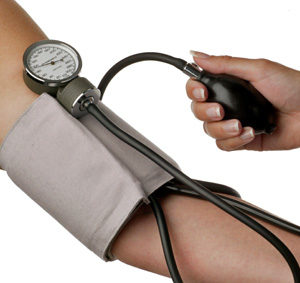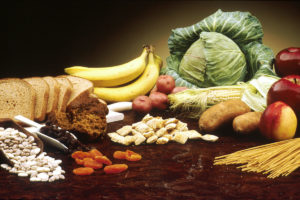 Can eating a vegetarian diet lower blood pressure? Both this review and other reviews of studies say YES, that those following vegetarian diets have a lower prevalence of hypertension. Overall, the mean prevalence of hypertension was 21% in those consuming a vegetarian diet and 29% in those consuming a nonvegetarian diet (the differences varied between studies).Those following a vegetarian diet also tended to have a healthier lifestyle. As the researchers point out: blood pressure medicine lowers blood pressure for one day, while lifestyle changes (diet, exercise, not smoking, limiting or avoiding alcohol) can lower blood pressure for life. From Medscape:
Can eating a vegetarian diet lower blood pressure? Both this review and other reviews of studies say YES, that those following vegetarian diets have a lower prevalence of hypertension. Overall, the mean prevalence of hypertension was 21% in those consuming a vegetarian diet and 29% in those consuming a nonvegetarian diet (the differences varied between studies).Those following a vegetarian diet also tended to have a healthier lifestyle. As the researchers point out: blood pressure medicine lowers blood pressure for one day, while lifestyle changes (diet, exercise, not smoking, limiting or avoiding alcohol) can lower blood pressure for life. From Medscape:
Vegetarian Diet: A Prescription for High Blood Pressure?
Hypertension is one of the most costly and poorly treated medical conditions in the United States and around the world. Consequences of hypertension include morbidity and mortality related to its long-term effects, which include stroke, myocardial infarction, renal failure, limb loss, aortic aneurysm, and atrial fibrillation, among many others. Although there is an armamentarium of medications to treat hypertension, we do little for prevention. In this review we examine the relationship between vegetarian and nonvegetarian diets and the prevalence of hypertension.
Current nonpharmacologic treatments include: physical activity (≥ 30 minutes of moderate-intensity activity on most days of the week); smoking cessation; dietary modification (lower sodium, increased potassium; mainly plant-based foods; low-fat foods; reduced-fat dairy products; moderate amounts of lean unprocessed meats, poultry, and fish; and moderate amounts of polyunsaturated and monounsaturated fats, such as olive oil); weight reduction; management of stress; and limited alcohol consumption.
It is well known that hypertension is modulated by dietary influences. In this review we examine vegetarian, vegan, and nonvegetarian (omnivore) diets and prevalence of hypertension among these dietary populations. A vegetarian diet (ie, lacto/ovo-vegetarian) includes plant foods, dairy products, and eggs (excludes all meat, such as turkey, beef, poultry, seafood, bacon, etc.). A vegan diet is similar to vegetarian, except it further excludes dairy products and eggs (no animal or animal products). On the other hand, an omnivore diet (referred to as nonvegetarians throughout this study) includes both plant and animal foods and products.....The majority of studies included in this review addressed vegetarians and vegans as a single group (vegetarians), whereas others differentiated them. Vegetarian diets are known to be low in saturated fat and cholesterol, high in fiber, low in sodium, and high in potassium. These key elements have been shown to correlate with lower incidence of cancer, heart disease, and other chronic diseases, such as diabetes type II, hypertension, and hyperlipidemia.
The exact percentage of those following a vegetarian or vegan diet in the US is unknown; however, a 2014 study found that 221 of 11,399 adult respondents, from a group generally representing the demographics of the US, identified as vegan (0.5%), vegetarians (1.5%), or meat-eaters (98%). The prevalence of hypertension in the US in 2011 was roughly 33.8%.
The mean prevalence of hypertension in those consuming a vegetarian diet was 21% and 29% in those consuming a nonvegetarian diet. The overall prevalence of hypertension among vegetarians was 33% lower than nonvegetarian diets. These data support the hypothesis of a decreased prevalence of hypertension in those maintaining a vegan or vegetarian diet versus a nonvegetarian diet, in cross-sectional, cohort, and case-control studies, and in those consuming a vegan or vegetarian diet according to an experimental dietary change. The blood pressure benefit is noted to disappear in those reverting back to a nonvegetarian diet.
Overall, these findings support previous reviews and meta-analyses of vegetarian and nonvegetarian diets and blood pressure. A recent meta-analysis that identified 39 studies with 21,915 participants concluded vegetarian diets were associated with a drop in mean systolic (-5.9 mm Hg) and diastolic (-3.5 mm Hg) blood pressures when compared with nonvegetarians. Other reviews had similar conclusions, showing that vegetarians have a lower blood pressure compared with nonvegetarians. Of the studies that included a vegan diet separate from other vegetarians (eg, lacto/ovo), the data show a significantly lower prevalence of hypertension when compared with nonvegetarians and other vegetarians. However, limited research has been conducted on strict, consistent vegan diets.
There are possible rationalizations for the observed associations between diet and hypertension. First, vegetarians have a lower rate of smoking tobacco. Smoking can increase blood pressure acutely and chronically over time.....Second, vegetarians tend to drink less alcohol compared with nonvegetarians. Alcohol, specifically ≥ 2 drinks/day, increases blood pressure by causing vasodilation, followed by a compensatory increase in blood pressure.....Further, vegetarians have a lower mean BMI when compared with nonvegetarians, which means a lower overall weight....Fourth, vegetarians tend to exercise more than nonvegetarians. Vegetarians reported a greater incidence of physical activity of ≥ 30 minutes of moderate to vigorous activity per day.
A limitation of this study is that it remains unclear whether vegetarians are more health conscious and therefore live healthier lives, or whether a predominant diet of fruits and vegetables is a basis for lower blood pressure.
 Vegan diets may be popular, but there is concern whether someone following a vegan diet can get all necessary nutrients from the diet and whether this impacts health in a negative way. This is because a person following a vegan diet avoids all animal foods - which means no dairy, no meat, no eggs, no honey, no fish, no shellfish, and no insects. This can mean difficulties in getting enough protein and some nutrients, for example choline (necessary for the brain), vitamin B-12, and calcium.
Vegan diets may be popular, but there is concern whether someone following a vegan diet can get all necessary nutrients from the diet and whether this impacts health in a negative way. This is because a person following a vegan diet avoids all animal foods - which means no dairy, no meat, no eggs, no honey, no fish, no shellfish, and no insects. This can mean difficulties in getting enough protein and some nutrients, for example choline (necessary for the brain), vitamin B-12, and calcium.
 Can eating a vegetarian diet lower blood pressure? Both this review and other reviews of studies say YES, that those following vegetarian diets have a lower prevalence of hypertension. Overall, the mean prevalence of hypertension was 21% in those consuming a vegetarian diet and 29% in those consuming a nonvegetarian diet (the differences varied between studies).Those following a vegetarian diet also tended to have a healthier lifestyle. As the researchers point out: blood pressure medicine lowers blood pressure for one day, while lifestyle changes (diet, exercise, not smoking, limiting or avoiding alcohol) can lower blood pressure for life.
Can eating a vegetarian diet lower blood pressure? Both this review and other reviews of studies say YES, that those following vegetarian diets have a lower prevalence of hypertension. Overall, the mean prevalence of hypertension was 21% in those consuming a vegetarian diet and 29% in those consuming a nonvegetarian diet (the differences varied between studies).Those following a vegetarian diet also tended to have a healthier lifestyle. As the researchers point out: blood pressure medicine lowers blood pressure for one day, while lifestyle changes (diet, exercise, not smoking, limiting or avoiding alcohol) can lower blood pressure for life. What was really interesting in the
What was really interesting in the